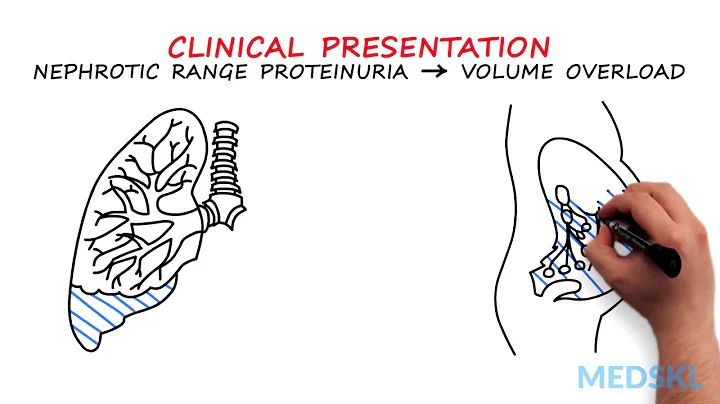Urinary protein , as an independent risk factor affecting the progression of renal function, not only prevents the complete reversal of damaged renal function, but also continues to cause damage to glomeruli. Therefore, it has always been regarded as a "stumbling block" in the process of protecting renal function.
The impact of urinary protein on renal function is not only the permeability of glomerular basement membrane, but also the emergence of other complications, including severe edema, hypoalbuminemia, etc., causing systemic damage to the whole body. , which has a greater impact on daily life. Therefore, controlling urinary protein to a reasonable range is the basic goal of chronic kidney disease treatment, especially the pathological type manifested as nephrotic syndrome . The lower the level of urinary protein control, the more beneficial it is to improve kidney function.

Will renal failure definitely not occur if urinary protein is reduced?
Overall, the ending is optimistic.
The prognosis of most types of kidney disease depends on the "color" of urinary protein, such as IgA nephropathy, membranous nephropathy, focal stage glomerulosclerosis, etc. The prognosis is related to urinary protein.
These pathological types generally urine protein quantification control within 0.5 grams will have little impact on kidney function. Attention should be paid to monitoring the progress of renal function, including changes in glomerular filtration rate , creatinine and other indicators.
Generally speaking, if urinary protein can be continuously controlled within the target range, even if kidney function still progresses slowly, the risk of renal failure in lifetime is still low.
Normally, urinary protein is controlled stably, early renal function progress slows down, and uremia is not easy to develop. However, in some patients, renal failure still occurs after the urinary protein is reduced. This requires attention to two points in the control process, one is to stabilize as quickly as possible, and the other is to maintain stability as much as possible and not always fluctuate.

Taking into account these two aspects, it is crucial to do three things during the treatment process of reducing urinary protein:
- 1. Pay more attention to pathological changes when taking protein-lowering medication
The pathological manifestations of kidney disease are mostly epithelial cells, podocytes, mesangium Cell proliferation causes the accumulation of immune complexes, further aggravates pathological damage, and causes abnormalities in indicators such as urinary protein, occult blood, and so on.
Therefore, on the one hand, reducing urinary protein is to protect the remaining glomerular cells; on the other hand, it is to fundamentally improve the renal blood flow supply, improve the overall renal function, inhibit pathological damage changes, and reduce urinary protein indicators.

- 2. When lowering protein, pay attention to reasonable combination of medication and get twice the result with half the effort.
Reasonable planning of urinary protein medication will have a direct impact on the condition. Generally divided into three situations:
1: A treatment plan based on hormones and immunosuppressant . This combination is relatively powerful and can control a large amount of protein in a short period of time and inhibit the development of immune and inflammatory reactions in the kidneys. Various combinations: Commonly used immunosuppressants include cyclophosphamide, tripterygium wilfordii, cyclosporine, tacrolimus, leflunomide and other drugs, which are suitable for those who are sensitive to hormones and have weak immunity. Moderate kidney friend .
2: Drugs such as Sartan/Preliminary/Protein/Statin can assist in reducing urinary protein, mainly as auxiliary treatment for secondary nephropathy and massive proteinuria. At the same time, it has positive significance in protecting glomeruli and delaying overall kidney function. Most people can use these drugs, but people whose kidney function has been significantly damaged need to be careful when using them.
3. Integrated traditional Chinese and Western medicine methods. Some patients will use the first category but have recurring conditions. They often need to be combined with traditional Chinese medicine to fundamentally improve immunity, reduce the risk of repeated infections, and keep urinary protein at a constant level. lower level.
Most patients may also use Chinese patent medicines such as Bailing capsules, nephritis recovery tablets, , etc., which can play a certain role, but if these methods are not combined, most of them will result in repeated drug withdrawals.

- 3. If you want urinary protein to remain at a low level, stay away from these situations
The problem encountered by some kidney patients is not that the urinary protein cannot be reduced, but that the urinary protein is not reduced completely or it falls again and again, and so on. It also causes adverse consequences for kidney function.
The main causes of unstable proteinuria are infection and irregular medications. Frequent infections include oral, urinary and respiratory tract infections are multiple. Improper use of medicines can lead to ineffectiveness of the medicine and delay the condition of the disease. For example, incorrect dosage increase or decrease of hormones, insufficient dosage of sartans, etc. will lead to failure to meet the standard or severe symptoms. In these situations, we must pay attention to reflection and conduct multiple comparisons to avoid errors.
If you have kidney problems such as , high creatinine, , renal syndrome, renal failure, etc., you can also click →→"





















